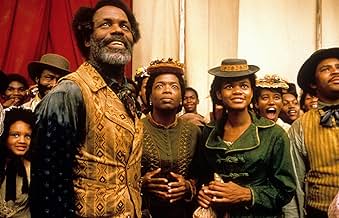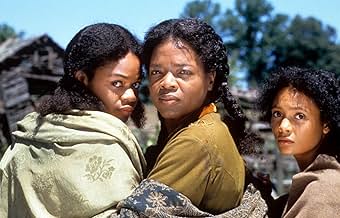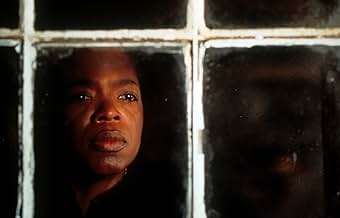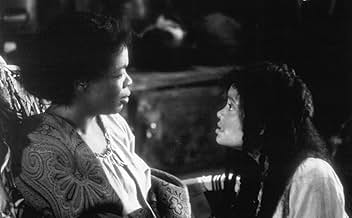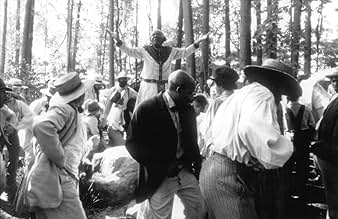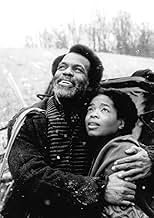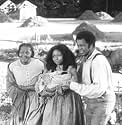IMDb रेटिंग
6.1/10
9.8 हज़ार
आपकी रेटिंग
अपनी भाषा में प्लॉट जोड़ेंA slave is visited by the spirit of a mysterious young woman.A slave is visited by the spirit of a mysterious young woman.A slave is visited by the spirit of a mysterious young woman.
- 1 ऑस्कर के लिए नामांकित
- 3 जीत और कुल 24 नामांकन
Kessia Embry
- Amy Denver
- (as Kessia Kordelle)
LisaGay Hamilton
- Younger Sethe
- (as Lisa Gay Hamilton)
Thandiwe Newton
- Beloved
- (as Thandie Newton)
फ़ीचर्ड समीक्षाएं
I found it difficult to understand the movie, and some of the dialogue, but it mattered little. I wish I'd read the book--perhaps I will, but I don't think so. A film must stand by itself, or it is not a film.
"Beloved" has long passages of greatness. First, it contains one of the best and most fascinating performances I've seen in years, given by Thandie Newton. She spent most of "Gridlock'd" in a coma, unfortunately, and that's the most notable role she's had until this one. Her first speaking (if you'll call it that) line is gripping, frightening, and amusing, and she plays a mental defective in a manner which I've never seen before. She has the loudest, rudest character, and many actresses would be put off by some of the things she must do throughout the film. However, our attention is also held by her quiet moments, as well as a few shots where the camera is content to gaze tranquilly into her beautiful eyes.
That camera is conducted with the supreme artistry of one of my favorite photographers, Tak Fujimoto, who was with director Jonathan Demme since the late '70s. Fujimoto is in love with earth and flesh tones here, but he also shoots his actors' eyes as if they were a part of the human body we'd never really noticed before, and wanted to give them the attention they deserved. It's a great approach to cinematography that pays off an infinite number of times, from the first major shot, of Sethe and Paul D reuniting (as Winfrey and Glover look at each other, they look not just into the camera, but directly into OUR eyes), to the last major shot, Jason Robards (God love him) staring in horror at a most unusual scene in front of Sethe's home.
This film is no "The Color Purple", with Welles-influenced camera angles and sacchirine-induced uplift. "Beloved" is a long, difficult, often off-putting film which doesn't really provide the big payoff at the end. This isn't necessarily good, but it isn't necessarily bad, either. Highlighted sequences include two truly remarkable sermons in the woods by Baby Suggs (Beah Richards--Oscar-nominated in '68 for "Guess Who's Coming to Dinner?"), a horrifying opening which features the most gruesome use of animatronics to date, and the notorious flashback which explain what has haunted Sethe all these years, and who Beloved really is.
I compare this film with "The Thin Red Line". Both come from notable directors, are based on famous novels, used huge budgets, and were very long. Both films disappointed many, many people. Most importantly, however, they both had parts which were greater than the whole, occasional strokes of genius, and were made by men who took the art of filmmaking seriously.
"Beloved" has long passages of greatness. First, it contains one of the best and most fascinating performances I've seen in years, given by Thandie Newton. She spent most of "Gridlock'd" in a coma, unfortunately, and that's the most notable role she's had until this one. Her first speaking (if you'll call it that) line is gripping, frightening, and amusing, and she plays a mental defective in a manner which I've never seen before. She has the loudest, rudest character, and many actresses would be put off by some of the things she must do throughout the film. However, our attention is also held by her quiet moments, as well as a few shots where the camera is content to gaze tranquilly into her beautiful eyes.
That camera is conducted with the supreme artistry of one of my favorite photographers, Tak Fujimoto, who was with director Jonathan Demme since the late '70s. Fujimoto is in love with earth and flesh tones here, but he also shoots his actors' eyes as if they were a part of the human body we'd never really noticed before, and wanted to give them the attention they deserved. It's a great approach to cinematography that pays off an infinite number of times, from the first major shot, of Sethe and Paul D reuniting (as Winfrey and Glover look at each other, they look not just into the camera, but directly into OUR eyes), to the last major shot, Jason Robards (God love him) staring in horror at a most unusual scene in front of Sethe's home.
This film is no "The Color Purple", with Welles-influenced camera angles and sacchirine-induced uplift. "Beloved" is a long, difficult, often off-putting film which doesn't really provide the big payoff at the end. This isn't necessarily good, but it isn't necessarily bad, either. Highlighted sequences include two truly remarkable sermons in the woods by Baby Suggs (Beah Richards--Oscar-nominated in '68 for "Guess Who's Coming to Dinner?"), a horrifying opening which features the most gruesome use of animatronics to date, and the notorious flashback which explain what has haunted Sethe all these years, and who Beloved really is.
I compare this film with "The Thin Red Line". Both come from notable directors, are based on famous novels, used huge budgets, and were very long. Both films disappointed many, many people. Most importantly, however, they both had parts which were greater than the whole, occasional strokes of genius, and were made by men who took the art of filmmaking seriously.
Beloved is a novel that relies heavily upon it's own language and the brilliant writing style in order to have its effect on the reader. One of its strongest points (and these are countless) is that it is about the period of American history near the end and immediately following slavery, when Negroes were still considered sub-human. It presents the story of the tremendous suffering of a few slaves during that time (and, indeed, during their entire lives), but the important thing is that the book does this with a startlingly small amount of graphic images and direct depictions of violence or cruelty. Because the movie is a visual account of the novel, it is unable to do this.
Sethe is a former slave who has suffered more hardships than most human beings (although, given the allusions to life on Sweet Home, she has not suffered even there the most), and the novel is about her life experiences and those of the slaves close to her. The most glaring problem here, which may have been unavoidable, is that Sethe's flashbacks could not be presented in the film in any other way than as brief, shocking images filled with violence and blood. This is not a problem because of anything to do with gratuitous violence, but because in the novel, Sethe lets out brief snapshots of her memories (which are too painful to directly tell as stories of her earlier life) as though she does not quite realize that she's doing it, then immediately stops herself when the pain hits her. The magnitude of her suffering is reduced to split-second sequences of brutality, which are presented as such but with no explanation or hint that they are that short because they are too painful to be any longer.
Besides the trouble that arises from having huge Hollywood superstars play the slaves here (which is a negligible fact because the performances are so powerful), the performance of Beloved, the title character, is entirely off the mark. Beloved embodies the epitome of Sethe's painful memories. She is Sethe's daughter (although not the only child) that Sethe was forced to kill to prevent them from going into slavery (thus providing the most significant act that allows us, indeed, FORCES us, to judge her as a person). When she is reborn from the river, she stumbles to 124 Bluestone Road, the house in which the majority of the movie and novel take place, and back into the lives of Sethe and Denver, the daughter that barely escaped the violence of her own mother's hands.
The problem with the performance is that, while it's true that Beloved was killed when she was two years old, and has not matured a day since then except physically, she does not act like a two-year-old child. The Beloved in Toni Morrison's novel has the maturity of a two-year-old and the physical, motherly needs of a two-year-old (most evident in her urgent need to be with Sethe), but she does not have the demeanor of one. I am reminded of John Malkovich's performance as Lennie Small in `Of Mice and Men.' Lennie Small is a huge, hulking man in the novel with a miniscule intelligence. He has the intellectual capacity and maybe even some of the same values as a seven or eight-year-old (such as `tenning dem wabbits'), but he doesn't act like one. Thandie Newton remembers in her performance that Beloved was a small child when she died, but she overuses it to the point where she drowns out much of the rest of the effect that she has on the story and those around her. Most importantly, her overdone performance distracts attention from the purpose that she is meant to serve in the story.
Beloved is the supernatural element of Toni Morrison's novel, who is there not because this is a supernatural story but because she represents the magnitude of the suffering that went on during slave times. She is a spiritual manifestation that requires no explanation except for her cause of death, and Newton's outlandish performance in the role reduces that effect because her behavior is not explained.
The film stays true to the magnitude of sorrow presented in the novel, but it transforms it from the slow, relentless, and immensely complicated version presented in the novel and into one of visuals and performance, which challenges successful actors to present the lives of people who have suffered more than most people alive can imagine. The film succeeds grandly in presenting the society in which Negroes were not humans but property. Sethe did not murder her children, she destroyed property that does not belong to her. But the important thing that is lost here is the shock that is delivered by the subtlety of the content. The emotion of the novel is enormously powerful, and yet it is all so subdued that even white people are almost not in it at all. They are little more than a lumbering presence that never shows its face (except for the single scene in the book that is presented from the point of view of white people), but is always looming dangerously just over the horizon. Beloved is a story that is too powerful to be told directly, because if it is, it will be weakened because the danger and the suffering becomes tangible, something that you can see and then forget about. The short descriptions and bits of events in the book force the mind to circle and work them until the full impact of their true meaning is realized.
Sethe is a former slave who has suffered more hardships than most human beings (although, given the allusions to life on Sweet Home, she has not suffered even there the most), and the novel is about her life experiences and those of the slaves close to her. The most glaring problem here, which may have been unavoidable, is that Sethe's flashbacks could not be presented in the film in any other way than as brief, shocking images filled with violence and blood. This is not a problem because of anything to do with gratuitous violence, but because in the novel, Sethe lets out brief snapshots of her memories (which are too painful to directly tell as stories of her earlier life) as though she does not quite realize that she's doing it, then immediately stops herself when the pain hits her. The magnitude of her suffering is reduced to split-second sequences of brutality, which are presented as such but with no explanation or hint that they are that short because they are too painful to be any longer.
Besides the trouble that arises from having huge Hollywood superstars play the slaves here (which is a negligible fact because the performances are so powerful), the performance of Beloved, the title character, is entirely off the mark. Beloved embodies the epitome of Sethe's painful memories. She is Sethe's daughter (although not the only child) that Sethe was forced to kill to prevent them from going into slavery (thus providing the most significant act that allows us, indeed, FORCES us, to judge her as a person). When she is reborn from the river, she stumbles to 124 Bluestone Road, the house in which the majority of the movie and novel take place, and back into the lives of Sethe and Denver, the daughter that barely escaped the violence of her own mother's hands.
The problem with the performance is that, while it's true that Beloved was killed when she was two years old, and has not matured a day since then except physically, she does not act like a two-year-old child. The Beloved in Toni Morrison's novel has the maturity of a two-year-old and the physical, motherly needs of a two-year-old (most evident in her urgent need to be with Sethe), but she does not have the demeanor of one. I am reminded of John Malkovich's performance as Lennie Small in `Of Mice and Men.' Lennie Small is a huge, hulking man in the novel with a miniscule intelligence. He has the intellectual capacity and maybe even some of the same values as a seven or eight-year-old (such as `tenning dem wabbits'), but he doesn't act like one. Thandie Newton remembers in her performance that Beloved was a small child when she died, but she overuses it to the point where she drowns out much of the rest of the effect that she has on the story and those around her. Most importantly, her overdone performance distracts attention from the purpose that she is meant to serve in the story.
Beloved is the supernatural element of Toni Morrison's novel, who is there not because this is a supernatural story but because she represents the magnitude of the suffering that went on during slave times. She is a spiritual manifestation that requires no explanation except for her cause of death, and Newton's outlandish performance in the role reduces that effect because her behavior is not explained.
The film stays true to the magnitude of sorrow presented in the novel, but it transforms it from the slow, relentless, and immensely complicated version presented in the novel and into one of visuals and performance, which challenges successful actors to present the lives of people who have suffered more than most people alive can imagine. The film succeeds grandly in presenting the society in which Negroes were not humans but property. Sethe did not murder her children, she destroyed property that does not belong to her. But the important thing that is lost here is the shock that is delivered by the subtlety of the content. The emotion of the novel is enormously powerful, and yet it is all so subdued that even white people are almost not in it at all. They are little more than a lumbering presence that never shows its face (except for the single scene in the book that is presented from the point of view of white people), but is always looming dangerously just over the horizon. Beloved is a story that is too powerful to be told directly, because if it is, it will be weakened because the danger and the suffering becomes tangible, something that you can see and then forget about. The short descriptions and bits of events in the book force the mind to circle and work them until the full impact of their true meaning is realized.
Even though 'Beloved' got mixed reviews, I thought it was wonderful. All the performances were amazing and Jonathan Demme did a wonderful job. I think the best performances were from Oprah and Kimberly Elise. Beah Richards was exceptionally good in her small role as Baby Suggs. I have studied slavery in the past, and I knew it was very brutal. But if you pair this move with 'Amistad' you get the real picture of slavery and how horrible it was. Another good performance came from Lisa Gay Hamilton as younger Sethe, because she exemplified the true spirit of the hopeful slave. I would not recommend to those who have a faint heart or who get squeamish easily.
Beloved is one of the best movies of the last decade. I have read many, many reviews which seem to have been written by those who have little to no idea of just how complex and difficult Toni Morrison's original novel can be. Of course Beloved (the movie) will be long, and of course it will be emotionally draining and even confusing - the book was! That said, I loved the novel and the film version of it, which follows the original material almost verbatim. (To try and change the story would be to tamper needlessly with a Pulitzer and Nobel Prize-winning book). I am no Oprah nut but she obviously had a deep respect and understanding for the story, which is evident in her surprisingly understated acting. Thandie Newton was simply amazing; I am glad I watched the film if for nothing else than the chance to see her performance (which, to be honest, has helped a key facet of the book make sense for me). The production design is flawless, and, as always, Jonathan Demme proves he's more than above average as a director. If you like pulp trash and want your movies dumb, loud, and shallow, avoid the movie version of Beloved. But if you're looking for a magnificently acted and gorgeously produced film, see this movie the first chance you get. I'm very glad I did.
READ THE BOOK, PEOPLE, READ THE BOOK! The book helped me understand the film and the film helped me understand the book. This is an amazing piece of work. Winfrey gives a moving and observant performance and Thandie Newton is startling. Some scenes are intense, making you think whether you would kill your child. I didn't notice any gliches and I think the film screams for Oscars. I think this whole slave movie thing going on is getting boring but when they are made with such power and great directing and acting, I praise God for it! Demme gives us one of the most touching ghost stories and certainly the strangest, in a while.
क्या आपको पता है
- ट्रिवियाThandiwe Newton's African first name means, interestingly enough, "beloved."
- गूफ़In the scene with a deer in the field, a car is visible driving by in the upper right hand corner.
- भाव
Baby Suggs: And the beat, beat, of your heart... Love it. More than the lungs that need yet to breathe free air. More than the womb, which holds life. More than the private parts that give life. Love your heart. This... this is the prize. Amen. This the prize... Amen!
- क्रेज़ी क्रेडिटIn lieu of traditional opening credits, the movie begins with the camera moving through a cemetery to focus on a gravestone engraved with the sole word "BELOVED".
- इसके अलावा अन्य वर्जनIn the version aired on television there is a deleted scene and two alternate scenes. The TV version also removes any mention of Sethe's sons. They don't exist in the TV version. The first alternate scene is when Paul D is telling Sethe about Halle being in the loft. In the theatrical you see Paul D quoting Halle. In the TV version there is a flashback to Halle (Hill Harper) saying "The loft." The second alternate scene in the prayer group discussing how to deal with Sethe being haunted by Beloved. In the theatrical there is a line about Sethe being like batter. In the Tv version that is removed and there is a line inserted from another woman saying "I don't mind a little communication between worlds but this is invasion" and another character says "we better get to work and pray" The deleted scene added for the TV version has Stamp Paid asking Paul D if beloved is his problem and not what Sethe did.
टॉप पसंद
रेटिंग देने के लिए साइन-इन करें और वैयक्तिकृत सुझावों के लिए वॉचलिस्ट करें
विवरण
- रिलीज़ की तारीख़
- कंट्री ऑफ़ ओरिजिन
- भाषाएं
- इस रूप में भी जाना जाता है
- Sevilen
- फ़िल्माने की जगहें
- उत्पादन कंपनियां
- IMDbPro पर और कंपनी क्रेडिट देखें
बॉक्स ऑफ़िस
- बजट
- $8,00,00,000(अनुमानित)
- US और कनाडा में सकल
- $2,28,52,487
- US और कनाडा में पहले सप्ताह में कुल कमाई
- $81,65,551
- 18 अक्तू॰ 1998
- दुनिया भर में सकल
- $2,28,52,487
- चलने की अवधि2 घंटे 52 मिनट
- रंग
- ध्वनि मिश्रण
- पक्ष अनुपात
- 1.85 : 1
इस पेज में योगदान दें
किसी बदलाव का सुझाव दें या अनुपलब्ध कॉन्टेंट जोड़ें



